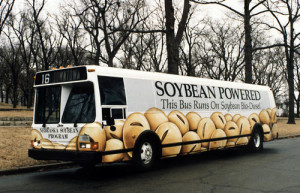Hawaii Using Food Waste for Sustainable Biofuel
Pacific Biodiesel, a biofuel company in Hawaii, is turning used cooking oils and food waste like papayas and macadamia nuts to run the first  certified sustainable biofuel plant in the United States. The point of biofuel is to reduce the environmental impact of carbon emissions, and some processing plants unfortunately are not ecofriendly. The certification that Pacific Biodiesel has earned is important to prove that not only do they produce biofuel, they do it in a way that actually benefits the community and planet. By using food waste products like cooking oil and produce that isn’t fit for selling, the company is also reducing the food waste issue that plagues the United States. Pacific Biodiesel sells its product back to Hawaiian businesses, meaning they also don’t have to worry about expensive and wasteful long distance transportation. This is a small scale production company, but it seems like smaller, sustainable plants may be the way to actually reduce emissions, instead of relying on large manufacturers.
certified sustainable biofuel plant in the United States. The point of biofuel is to reduce the environmental impact of carbon emissions, and some processing plants unfortunately are not ecofriendly. The certification that Pacific Biodiesel has earned is important to prove that not only do they produce biofuel, they do it in a way that actually benefits the community and planet. By using food waste products like cooking oil and produce that isn’t fit for selling, the company is also reducing the food waste issue that plagues the United States. Pacific Biodiesel sells its product back to Hawaiian businesses, meaning they also don’t have to worry about expensive and wasteful long distance transportation. This is a small scale production company, but it seems like smaller, sustainable plants may be the way to actually reduce emissions, instead of relying on large manufacturers.
PepsiCo Quietly Adds GMO Labels to Some Products
Vermont’s GMO labeling law goes into effect in just a few  months, and many companies have announced they will add GMO labels to their products nationwide. PepsiCo has made no such announcement, but consumers have found cans of soda and bags of chips with labels stating “Partially Produced with Genetic Engineering”. It is thought that PepsiCo has remained quiet about this move because they are involved in the lawsuit against Vermont’s labeling law. PepsiCo has been uncooperative in turning over requested documents and data, and is actively fighting the labeling law, but we’re happy to see some GMO labels. Consumers deserve the choice of buying genetically altered products or not.
months, and many companies have announced they will add GMO labels to their products nationwide. PepsiCo has made no such announcement, but consumers have found cans of soda and bags of chips with labels stating “Partially Produced with Genetic Engineering”. It is thought that PepsiCo has remained quiet about this move because they are involved in the lawsuit against Vermont’s labeling law. PepsiCo has been uncooperative in turning over requested documents and data, and is actively fighting the labeling law, but we’re happy to see some GMO labels. Consumers deserve the choice of buying genetically altered products or not.
GMO Labeling Fight is Moved to Vermont
A federal judge has decided that the battle over Vermont’s GMO labeling law needs  to be decided in Vermont courts. We’ve been following this case since its inception, and we know that as the July 1 deadline approaches, major food companies will continue to fight the law tooth and nail. The Grocery Manufacturer’s Association (GMA) is fighting the law because they think the law violates the First Amendment and is unconstitutional. Food companies such as DuPont and Syngenta are fighting Vermont’s request for documents and data regarding public opinion and safety of GMOs. Connecticut and Maine have passed GMO labeling laws but with trigger clauses, meaning other states must pass labeling requirements before theirs go into effect. The stakes are high for consumers, so keep the pressure on your elected officials. The next few months could very well decide the direction of the food industry.
to be decided in Vermont courts. We’ve been following this case since its inception, and we know that as the July 1 deadline approaches, major food companies will continue to fight the law tooth and nail. The Grocery Manufacturer’s Association (GMA) is fighting the law because they think the law violates the First Amendment and is unconstitutional. Food companies such as DuPont and Syngenta are fighting Vermont’s request for documents and data regarding public opinion and safety of GMOs. Connecticut and Maine have passed GMO labeling laws but with trigger clauses, meaning other states must pass labeling requirements before theirs go into effect. The stakes are high for consumers, so keep the pressure on your elected officials. The next few months could very well decide the direction of the food industry.

Comments are closed.